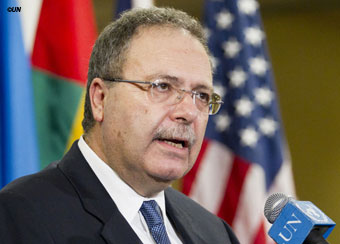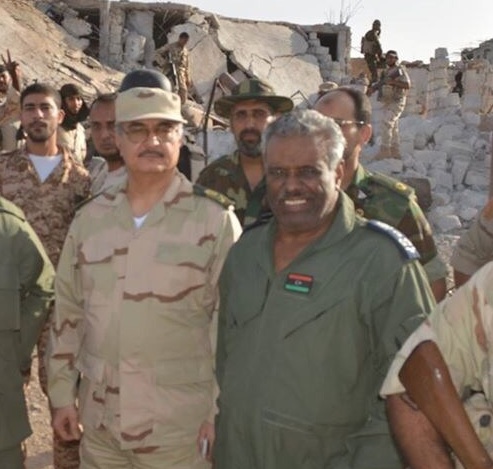By Libya Herald staff.

Tripoli, 16 October 2014:
Libya’s current crisis is the result of a basic miscalculation in the first days after . . .[restrict]the success of the Revolution. The National Transitional Council should have used its position to start rebuilding state institutions rather than holding elections in 2012 and ceding power to the country’s newly-elected parliament.
This is the view of the former chief of the United Nations Support Mission in Libya, Tarek Mitri, who has said that first post-Qaddafi election was good by any standard and enjoyed wide and enthusiastic participation. “However, how can elections be held in a jungle of arms and in the absence of institutions, a judiciary and a national consensus on the priorities of proper state-building?”
Mitri said that the political elites bore a great responsibility because 43 years of dictatorship had led to the death of politics.
“There were small opposition groups living abroad, but for them to lead a revolution and to rule this country requires a degree of experience, skill, knowledge and political culture they do not have. A politician cannot become a statesman overnight.
“This is normal,” said Mitri, ” The National Transitional Council was cohesive at a certain moment, thus allowing for international intervention. It was cohesive in addressing the world and the conditions allowed the international community to deal positively with it”.
Talking this week to the pan-Arab newspaper Al-Hayat, Mitri went on to opine “ In other words, the election made the power struggle take precedence over the state-building process. Building the state should have preceded the struggle for power”.
The upshot was armed confrontations that have led to Misrata and its allied Islamic battalions controlling Tripoli, Benghazi, Misrata, Sirte and most coastal cities. “This means that we now have a legitimate parliament, which endorsed a government, facing a large alliance controlling the greater part of the country” said Mitri.
His view is that Libya has been a country of missed opportunities. He was particularly critical of the Political Isolation Law saying that it was even more extensive than the de-Baathication law in Iraq. “ It was made to remove all those who had dealt with Qaddafi or served in his state. He ruled for 43 years. Those who worked [under him] as ambassadors, directors, and faculty deans are very numerous. Excluding them has weakened the chance to build the state”.
Mitri cited the case of the first president of the General National Congress, Mohammad Al-Megarief who, he said, was a figure who had really impressed him. Formerly Qaddafi’s ambassador to India, he had resigned from the psitionafter falling out with the dictator. Thereafter he became a leading member of the exiled opposition.
After the revolution “ He tried to play his role as president of the General National Conference and tried to rise above political conflicts,” said Mitri, “He did not succeed though, because he was between the jaws of the pliers: Islamists on the one hand and nationalist non-Islamists on the other hand. His party in the General National Congress was small and he was not able to achieve what he had aspired to.
“Despite his record,” said Mitri, “the political isolation law was about to include him. Instead of waiting to be excluded by this law, he resigned and left Libya with dignity. That deserves respect”.
Mitri said that there were may competent individuals but their political experience was limited. All political movements were poorly organised save the Muslim Brotherhood and its political face, the Justice and Construction party.
Nowadays, said Mitri, everyone was talking about dialogue and no one saw a way out of the current impasse except through dialogue. Mitri who left the UNSMIL role this September said “ In June, I saw that things would soon deteriorate and that we were moving toward armed confrontation. I invited the parties to dialogue. My call was thwarted because some believed that Libya could be ruled with one side defeating the other, even if the winners were based on a majority vote”.
He continued: “My invitation was misunderstood. In short, the nationalist non-Islamist forces considered themselves the winners and Islamists the losers. Why would the winner want to dialogue with the loser when dialogue would mean, from [the winner’s] perspective, that they have to make concessions? I told them that the issue was not a matter of winner and loser, but it was about Libya’s national unity and peace, and that no party could eliminate the other. You could win an election, but not eliminate others. The two of you must meet to agree on the minimum in order to avoid the country’s collapse, which ended up happening”.
Mitri pointed out that though non-Islamists won the election with a much larger majority than some had predicted, in a country with so many divisions and so many weapons, dialogue had still been necessary. However some had thought that the election victory was sufficient unto itself. Now, said Mitri, with the country in a state of civil war, everybody found that they needed dialogue after all.
Speaking before Wednesday’s renewed assault on Ansar Al-Shara positions in Benghazi, Mitri demonstrated reservations about the Dignity operations of Khalifa Hifter. He said that the former Qaddafi general was a controversial figure for many Libyans, a lot of whom did not trust him. He said that many, who had supported him initially because Ansar were his avowed target, were reviewing their calculations. Their hopes had been that the Libyan army, neglected and weakened under the old regime could be revitalised and help restore peace and security.
The problem, said Mitri “Is that Hifter did not confront just Ansar al-Sharia, but expanded the circle of his opponents and confronted Islamists in general, as well as some rebel battalions allied with Islamists”. This, in his analysis, had led to armed groups pushing the army and legitimate forces out of Benghazi except for the airport.
Quizzed by Al Hayat as to what he meant by “armed groups”, Mitri said he was speaking of a mixture, made up mostly of Islamists but also of of rebel battalions which had taken part in the revolution and were now allied with the Islamists.
In Mitri’s view, the stance of the international community was mixed. “Some are truly interested in helping Libya, but do not know how to provide real support. Others are hesitant, sometimes suggesting that Libya is important for them and at other times not paying attention to it”.
Mitri said that he did not believe that the military intervention of 2011 would be repeated. This had produced a feeling of international helplessness. Mitri seemed to be saying that in these circumstances, lacking a clear political will and a desire and ability to address Libya’s crisis, foreign powers were defaulting to a call for dialogue as a way of averting total chaos.
“Now everybody is saying, let the Libyans talk and agree and we will support them, and let the political process resume after agreeing on the priorities of national construction”.
[/restrict]








